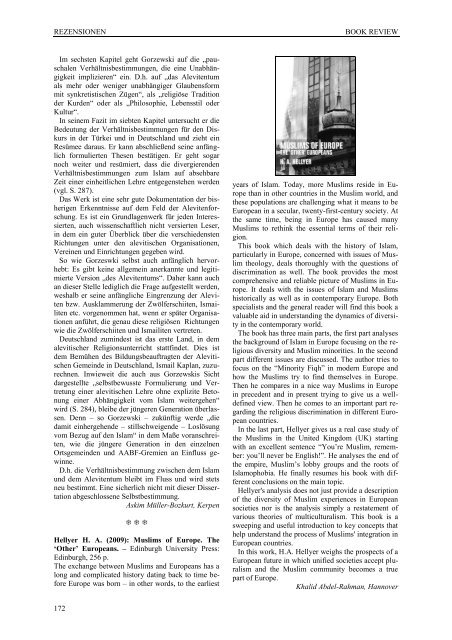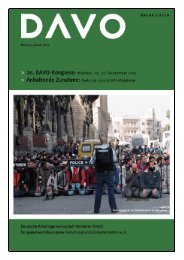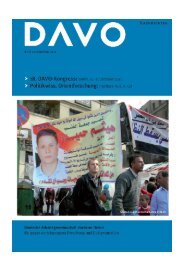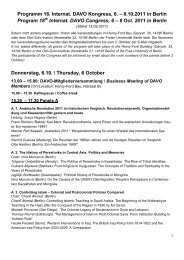4 Dissertationen und Habilita- tionen / Dissertations and Habilitations
4 Dissertationen und Habilita- tionen / Dissertations and Habilitations
4 Dissertationen und Habilita- tionen / Dissertations and Habilitations
Sie wollen auch ein ePaper? Erhöhen Sie die Reichweite Ihrer Titel.
YUMPU macht aus Druck-PDFs automatisch weboptimierte ePaper, die Google liebt.
REZENSIONEN BOOK REVIEW<br />
Im sechsten Kapitel geht Gorzewski auf die „pauschalen<br />
Verhältnisbestimmungen, die eine Unabhängigkeit<br />
implizieren“ ein. D.h. auf „das Alevitentum<br />
als mehr oder weniger unabhängiger Glaubensform<br />
mit synkretistischen Zügen“, als „religiöse Tradition<br />
der Kurden“ oder als „Philosophie, Lebensstil oder<br />
Kultur“.<br />
In seinem Fazit im siebten Kapitel untersucht er die<br />
Bedeutung der Verhältnisbestimmungen für den Diskurs<br />
in der Türkei <strong>und</strong> in Deutschl<strong>and</strong> <strong>und</strong> zieht ein<br />
Resümee daraus. Er kann abschließend seine anfänglich<br />
formulierten Thesen bestätigen. Er geht sogar<br />
noch weiter <strong>und</strong> resümiert, dass die divergierenden<br />
Verhältnisbestimmungen zum Islam auf absehbare<br />
Zeit einer einheitlichen Lehre entgegenstehen werden<br />
(vgl. S. 287).<br />
Das Werk ist eine sehr gute Dokumentation der bisherigen<br />
Erkenntnisse auf dem Feld der Alevitenforschung.<br />
Es ist ein Gr<strong>und</strong>lagenwerk für jeden Interessierten,<br />
auch wissenschaftlich nicht versierten Leser,<br />
in dem ein guter Überblick über die verschiedensten<br />
Richtungen unter den alevitischen Organisa<strong>tionen</strong>,<br />
Vereinen <strong>und</strong> Einrichtungen gegeben wird.<br />
So wie Gorzeswki selbst auch anfänglich hervorhebt:<br />
Es gibt keine allgemein anerkannte <strong>und</strong> legitimierte<br />
Version „des Alevitentums“. Daher kann auch<br />
an dieser Stelle lediglich die Frage aufgestellt werden,<br />
weshalb er seine anfängliche Eingrenzung der Aleviten<br />
bzw. Ausklammerung der Zwölferschiiten, Ismailiten<br />
etc. vorgenommen hat, wenn er später Organisa<strong>tionen</strong><br />
anführt, die genau diese religiösen Richtungen<br />
wie die Zwölferschiiten <strong>und</strong> Ismailiten vertreten.<br />
Deutschl<strong>and</strong> zumindest ist das erste L<strong>and</strong>, in dem<br />
alevitischer Religionsunterricht stattfindet. Dies ist<br />
dem Bemühen des Bildungsbeauftragten der Alevitischen<br />
Gemeinde in Deutschl<strong>and</strong>, Ismail Kaplan, zuzurechnen.<br />
Inwieweit die auch aus Gorzewskis Sicht<br />
dargestellte „selbstbewusste Formulierung <strong>und</strong> Vertretung<br />
einer alevitischen Lehre ohne explizite Betonung<br />
einer Abhängigkeit vom Islam weitergehen“<br />
wird (S. 284), bleibe der jüngeren Generation überlassen.<br />
Denn – so Gorzewski – zukünftig werde „die<br />
damit einhergehende – stillschweigende – Loslösung<br />
vom Bezug auf den Islam“ in dem Maße voranschreiten,<br />
wie die jüngere Generation in den einzelnen<br />
Ortsgemeinden <strong>und</strong> AABF-Gremien an Einfluss gewinne.<br />
D.h. die Verhältnisbestimmung zwischen dem Islam<br />
<strong>und</strong> dem Alevitentum bleibt im Fluss <strong>und</strong> wird stets<br />
neu bestimmt. Eine sicherlich nicht mit dieser Dissertation<br />
abgeschlossene Selbstbestimmung.<br />
Askim Müller-Bozkurt, Kerpen<br />
172<br />
� � �<br />
Hellyer H. A. (2009): Muslims of Europe. The<br />
‘Other’ Europeans. – Edinburgh University Press:<br />
Edinburgh, 256 p.<br />
The exchange between Muslims <strong>and</strong> Europeans has a<br />
long <strong>and</strong> complicated history dating back to time before<br />
Europe was born – in other words, to the earliest<br />
years of Islam. Today, more Muslims reside in Europe<br />
than in other countries in the Muslim world, <strong>and</strong><br />
these populations are challenging what it means to be<br />
European in a secular, twenty-first-century society. At<br />
the same time, being in Europe has caused many<br />
Muslims to rethink the essential terms of their religion.<br />
This book which deals with the history of Islam,<br />
particularly in Europe, concerned with issues of Muslim<br />
theology, deals thoroughly with the questions of<br />
discrimination as well. The book provides the most<br />
comprehensive <strong>and</strong> reliable picture of Muslims in Europe.<br />
It deals with the issues of Islam <strong>and</strong> Muslims<br />
historically as well as in contemporary Europe. Both<br />
specialists <strong>and</strong> the general reader will find this book a<br />
valuable aid in <strong>und</strong>erst<strong>and</strong>ing the dynamics of diversity<br />
in the contemporary world.<br />
The book has three main parts, the first part analyses<br />
the backgro<strong>und</strong> of Islam in Europe focusing on the religious<br />
diversity <strong>and</strong> Muslim minorities. In the second<br />
part different issues are discussed. The author tries to<br />
focus on the “Minority Fiqh” in modern Europe <strong>and</strong><br />
how the Muslims try to find themselves in Europe.<br />
Then he compares in a nice way Muslims in Europe<br />
in precedent <strong>and</strong> in present trying to give us a welldefined<br />
view. Then he comes to an important part regarding<br />
the religious discrimination in different European<br />
countries.<br />
In the last part, Hellyer gives us a real case study of<br />
the Muslims in the United Kingdom (UK) starting<br />
with an excellent sentence “You’re Muslim, remember:<br />
you’ll never be English!”. He analyses the end of<br />
the empire, Muslim’s lobby groups <strong>and</strong> the roots of<br />
Islamophobia. He finally resumes his book with different<br />
conclusions on the main topic.<br />
Hellyer's analysis does not just provide a description<br />
of the diversity of Muslim experiences in European<br />
societies nor is the analysis simply a restatement of<br />
various theories of multiculturalism. This book is a<br />
sweeping <strong>and</strong> useful introduction to key concepts that<br />
help <strong>und</strong>erst<strong>and</strong> the process of Muslims' integration in<br />
European countries.<br />
In this work, H.A. Hellyer weighs the prospects of a<br />
European future in which unified societies accept pluralism<br />
<strong>and</strong> the Muslim community becomes a true<br />
part of Europe.<br />
Khalid Abdel-Rahman, Hannover





